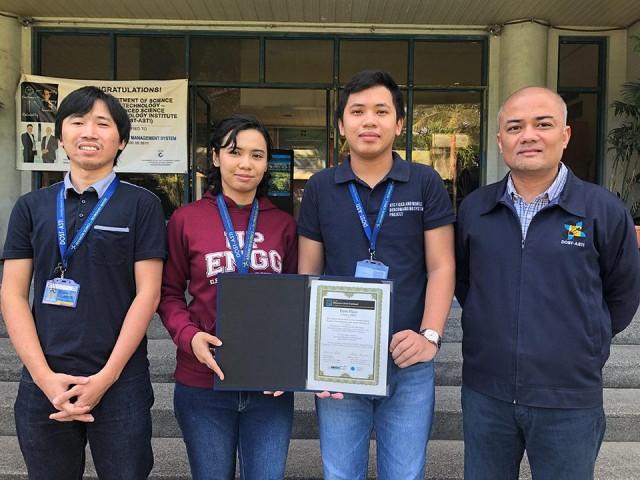Pinoy researchers bag top prize at space mission idea contest in Japan
Filipino researchers recently won the first prize during the 6th Space Mission Idea Contest (MIC6) in Japan for their work on capturing and mapping the digital divide in space using radio frequency spectrum measurements.
The MIC6 was held on December 2, 2019 during the 7th University Space Engineering Consortium-Global (UNISEC-Global) Meeting.

From L-R Calvin Artemies Hilario, Genedyn Mendoza, Mar De Guzman and Dr. Joel Joseph Marciano, Jr.
According to a press release from the Department of Science and Technology (DOST), the team's research focused on using an IVA-replaceable Small Exposed Experiment Platform (i-SEEP) in gathering processed SMoSiS spectrum data.
"Spectrum Monitoring from Space with i-SEEP (SMoSiS) aims to provide measurements of RF (radio frequency) spectrum occupancy on earth to detect the presence/lack of telecomminication and broadcast services," the statement read.
The processed SMoSiS spectrum data can greatly help in determining unserved and under-served areas in telecommunication and broadcasting, as well as detecting anomalies like the disruption and recovery of wireless technology services during disasters.
"SMoSiS also studies the utilization of the radio spectrum towards better planning, management and regulation of this vital resource in support of fulfilling Sustainable Development Goal -10 (Reduced Inequalities)," added the DOST.
The authors of the research, who hailed from the DOST-Advanced Science and Technology Institute (ASTI) and the University of the Philippines (UP) Diliman are Mar Francis De Guzman, Genedyn Gems Mendoza, Calvin Artemies Hilario, and the newly-conferred Director-General of the Philippine Space Agency Dr. Joel Joseph Marciano, Jr.
Asked about the projected uses of mapped data from radio frequency spectrum measurements, Marciano answered that it could benefit the public in several ways.
"It’s really putting this kind of information in people’s hands, we don’t have all the possible uses of the data. They might correlate it with something, but for us we want to correlate it with night lights, economic activity, household income... where are the unserved and underserved populations," he said.
This is the first time that the Philippine participated, and won, at the MIC.
The Pinoy researchers bested others from countries like Bulgaria, Indonesia and Japan.
The MIC is a contest that gives people interested in space research the chance to introduce creative ideas on payloads for the International Space Station (ISS) platforms.
—Angelica Y. Yang/JCB, GMA News



